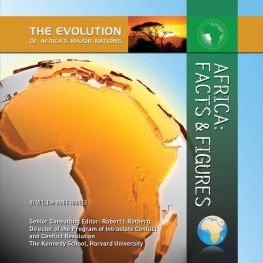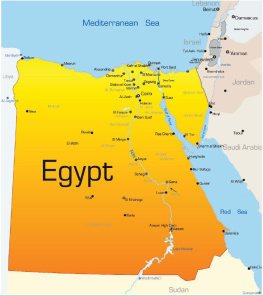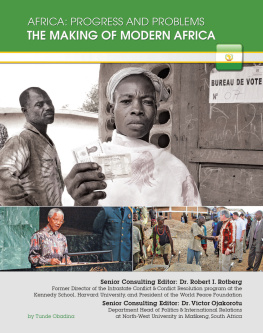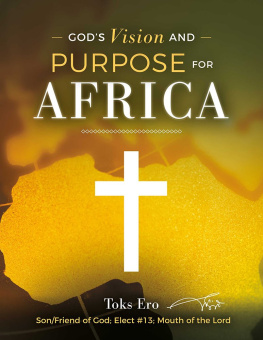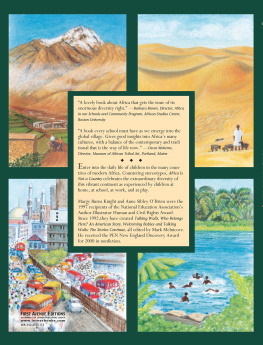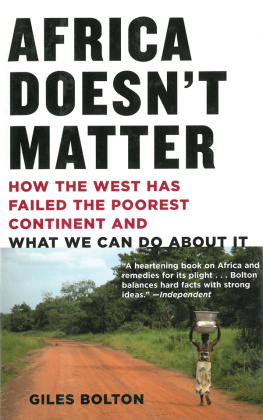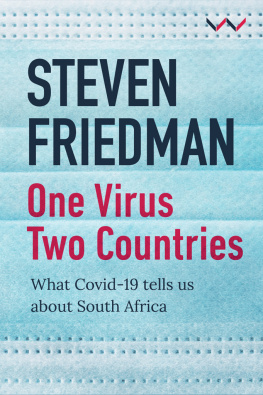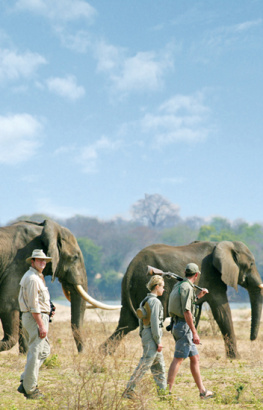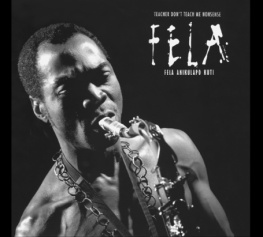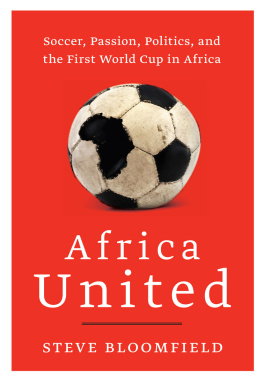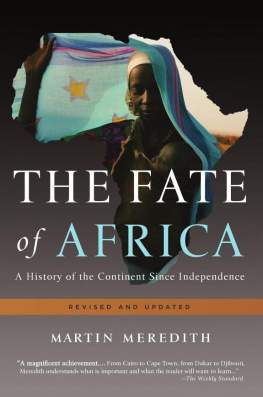CONTRIBUTORS

Professor Robert I. Rotberg is Director of the Program on Intrastate Conflict and Conflict Resolution at the Kennedy School, Harvard University, and President of the World Peace Foundation. He is the author of a number of books and articles on Africa, including A Political History of Tropical Africa and Ending Autocracy, Enabling Democracy: The Tribulations of Southern Africa.
William Mark Habeeb is a professor and international affairs consultant in Washington, D.C. He specializes in Middle East politics and conflict resolution. He has written widely on such topics as international negotiation, the politics and culture of North African states, and the Arab-Israeli conflict. He received his PhD in international relations from the Johns Hopkins University School of Advanced International Studies.
Festivals and celebrations are a major part of life in Africa. Every ethnic group, as well as every country, has its own particular celebrations and holidays. Other celebrations are common to many parts of this vast continent. Below is a sampling of some of Africas most important festivals.
January
New Years Day is a holiday in many African countries, even those that do not follow the Western calendar. January 1 also is Independence Day in Sudan. Epiphany, a Christian holiday celebrating the baptism of Christ, is observed by Christian communities throughout the continent. In Ethiopia, Epiphany is known as Timkat, and is one of the most important celebrations of the Ethiopian Orthodox Church. In early January, Mali celebrates the annual Festival du Desert (Festival of the Desert), an international celebration of music and dancing held in Timbuktu. In Mauritius, which has a large Chinese community, the Chinese New Year is held on January 22.
February
Africas largest annual film festival, the Fespaco Film Festival, is held in late February in Ouagadougou, Burkina Faso. In the Muslim areas of Nigeria, the annual Durbar Festival commemorates the glories of the former Muslim emirate of northern Nigeria. On the island of Zanzibar (part of Tanzania), the annual Swahili Music and Culture Festival is held on a three-day weekend in mid-February. It features Swahili music, theater, and dance. In Egypt, the Abu Simbel Festival, held on February 22 and December 22 at the ancient temple of the same name, is celebrated on the two days of the year that the sun shines directly upon the temples shrine.
March
March 20 is Tunisias Independence Day. The annual Carnaval de Bouak in Ivory Coast has become one of Africas largest festivities. It is an opportunity for the residents of Bouak to show off their city and its culture. The carnival includes musical performances, culinary events, and an agricultural fair. The Kilimanjaro Marathon is held every March in Tanzania, attracting runners from around the world.
April
April 4 is Senegals Independence Day. April 24, Freedom Day, is a major holiday in South Africa. In Mali, the Fete des Masques is a celebration of the mask-making tradition of the countrys Dogon people.
May
Like much of the world, many African countries celebrate Labor Day as a public holiday on May 1. Mawlid al-Nabiy, the commemoration of the birthday of the prophet Muhammad, is a Muslim holiday celebrated by prayer and often a procession to the local mosque. The Aboakyer Festival, held in the villages of central Ghana, celebrates the migration of the Wineba people from Sudan to Ghana. The South Sinai Camel Festival in Egypt features camel races.
June
The annual Festival of the Dhow Countries, held in Zanzibar, celebrates the culture of the Muslim seafarers of the Indian Ocean. The World Festival of Sacred Music, held each year in Fez, Morocco, features diverse religious musical performances from around the world.
July
Independence Day is celebrated in Somalia, Burundi, and Rwanda on July 1, in Malawi on July 6, in the Republic of Southern Sudan on July 9, and in Liberia on July 26. Egyptians celebrate Revolution Day on July 23. The Panafest is a celebration of African performing arts held in Ghana.
August
August 1 is National Day in Benin, and August 11 is Independence Day in Chad. The Homowo Festival is an annual harvest celebration in Ghana. The International Camel Derby and Festival, held in Kenya, features a long camel race as well as music and other events.
September
The Imilchil Wedding Festival in Morocco is a unique event in which young men and women gather in the village of Imilchil and brides choose their grooms. The Hermanus Whale Festival in South Africa is a celebration of nature featuring whale-watching, music, food, and performances.
October
October 1 is Independence Day in Nigeria and October 2 in Guinea. Fete de lAbissa is a weeklong carnival held in the former colonial capital and beach resort of Grand Bassam in Ivory Coast. The Cairo Film Festival is the most important film event in the Arab world.
November
Among Christian communities, November 1 is All Saints Day, a holiday honoring all of the churchs saints. The village of Man in Ivory Coast is the scene of the annual Fetes des Masques (Festival of Masks). The Mombasa Carnival, in Kenya, features parades with floats representing each of Kenyas many cultural influences.
December
The Crossing of the Cattle is an important holiday in Mali, honoring the cattle herders who spend most of the year seeking grazing grounds. Incwala, a holiday celebrated in Swaziland, kicks off the harvest season with religious and family celebrations. Africas Christians celebrate Christmas Day on December 25 with church services and family gatherings. It also is a national holiday in many countries.
Other Religious Celebrations
African Muslims and Christians observe a number of important holy days related to their religions. Some of these, such as Christmas, are on particular days each year. However, many other major celebrations are held according to a lunar calendar, in which the months correspond to the phases of the moon. A lunar month is shorter than a typical month of the Western calendar. Therefore, the festival dates vary from year to year. Other celebrations are observed seasonally.
Ramadan is a month-long Muslim holiday during which time devout Muslims fast and pray throughout the daylight hours. It is the holiest period in Islam. As soon as the sun goes down, families and friends gather in homes for a meal marking the end of the fasting day. At the end of Ramadan, Muslims celebrate a major holiday called Eid al-Fitr (Festival of the Breaking of the Fast). This is a joyous time characterized by feasts and the exchange of gifts.
Eid al-Adha (Feast of Sacrifice) takes place in the last month of the Muslim calendar during the hajj period, when Muslims make a pilgrimage to Mecca. The holiday honors the prophet Abraham, who was willing to sacrifice his own son to Allah. Each of these holidays is celebrated with a feast. On Eid al-Adha, families traditionally eat a third of the feast and donate the rest to the poor.
The major Christian festivals on the lunar cycle involve the suffering and death of Jesus Christ. Ash Wednesday marks the start of a period of self-sacrifice called Lent, which lasts for 40 days. The final eight days of Lent, which include
Next page
